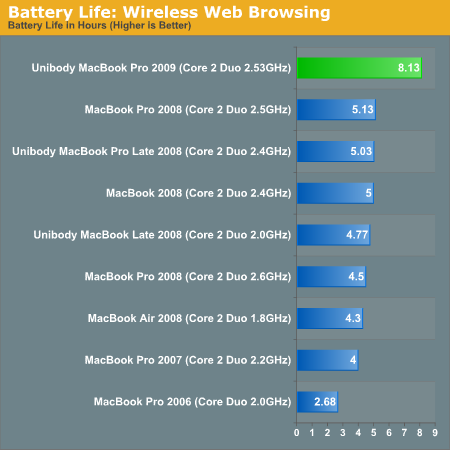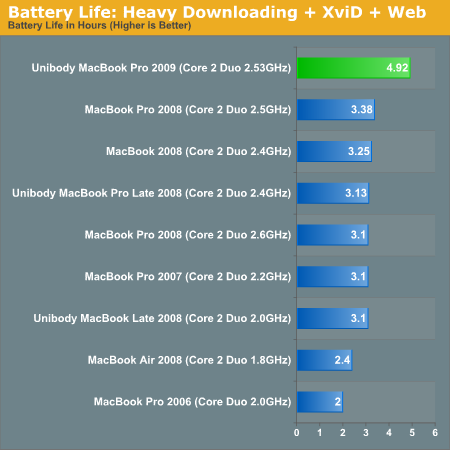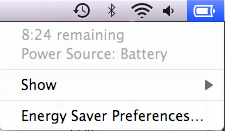Apple's 2009 MacBook Pro: Battery Life to Die For
by Anand Lal Shimpi on June 12, 2009 12:00 AM EST- Posted in
- Mac
The Best Battery Life I’ve Ever Seen
To find out how well the new lithium polymer battery does I ran my usual suite of Mac battery life tests. First up was my wireless web browsing test:
The wireless web browsing test uses the 802.11n connection to browse a series of 20 web pages varying in size, spending 20 seconds on each page (I timed how long it takes me to read a page on Digg and came up with 36 seconds; I standardized on 20 seconds for the test to make things a little more stressful). The test continues to loop all while playing MP3s in iTunes.
This is an extremely light test as none of the web pages have any flash ads, but it’s a valid test of very light wireless usage.

Eight, freakin, hours. I couldn't believe it. In my lightest test, the new 15-inch MacBook Pro lasted eight hours and eight minutes. That's with the screen at half brightness (completely usable) and no funny optimizations. The notebook is just playing music and surfing through a lot of my old reviews. There's no way this could be right. Maybe my test was too light?
I threw together another test just to make sure. The key flaw in my initial wireless web browsing test is that it none of web pages have any Flash on them. While constantly loading web pages will ensure the CPU can't go into deep sleep, Flash on the pages would make sure that the CPU utilization remains higher at all times. The next test I put together was this:
I strung together 8 reviews on AnandTech and put them each on a single page, images and all. I then scoured the web for big, animated Flash ads and added anywhere from 1 - 4 ads per page; all Flash. Each page is designed to forward to the next after 10 seconds and the loop continues indefinitely. On each machine I opened three Safari windows and pointed them at the first page in the sequence. In the background, once more, I had iTunes playing MP3s.
I found that CPU utilization varied from 5 - 35% during this test, which is about what I saw when I was actually surfing the web myself. The addition of Flash should make it more stressful, but it's still a fairly light usage test. My original web browsing test got us 8 hours, so what about this new one?
| MacBook Pro 2009 | MacBook Pro Late 2008 | |
| Wireless Web Browsing w/ Flash | 6.48 hours | 3.28 hours |
Six and a half hours, out of a 5.5 lbs notebook. For comparison, the older MacBook Pro could only manage 3 hours and 17 minutes in the same test. The new notebook lasted almost twice as long. Mathematically, this doesn't make sense. There's only a 46% increase in battery capacity, there shouldn’t be a ~100% increase in battery life...ever.
While the original web browsing test was using data from my original unibody MacBook Pro review, this second web test used a brand new MacBook Pro (purchased just weeks before this week's MacBook Pro announcement). The two notebooks had the same amount of memory (4GB), the older MacBook Pro had a slower CPU (2.4GHz vs. 2.53GHz) and a 7200RPM hard drive but the differences shouldn’t account for an extra 54% increase in battery life.
Apple must have done more than just increase battery capacity in the new MacBook Pro. My third test continues to support my findings. This is my heavy workload benchmark.
For this benchmark I'm downloading 10GB worth of files from the net (constant writes to the drive), browsing the web (same test as the first one) and watching the first two episodes of Firefly encoded in a 480p XviD format (Quicktime is set to loop the content until the system dies).
The older MacBook Pro managed 3.25 hours in this test. The new one? Just under 5:

That's a 51% improvement in battery life. It's close enough to the max theoretical 46% improvement for me to think that the significant gains in wireless web browsing are due to improvements in idle power optimizations. It's possible that all of the components in the new MacBook Pro have been optimized for lower voltages at idle.
The battery tests are repeatable however. I saw anywhere from a 50 - 100% improvement in battery life over the old MacBook Pro. Given the increase in battery capacity alone, you should see no less than a 46% increase in battery life. Exactly what is accounting for the expanded life above and beyond that, I'm not sure.
Either way, Apple's 7 hour claim is well within reason. For light workloads, even on WiFi, you can easily expect 6.5 - 8 hours out of the new 15-inch MBP. As I write this article on that very system I'm told that I have nearly 8.5 hours left on my charge. If you do a lot of writing on your notebook, the new MBP is exactly what you'll want; it will easily last you on a cross-country flight if you need to get work done.

I think I've just found my new writer's companion
My heaviest workload delivered just under 5 hours of battery life, a figure that the old MBP could only attain while running my lightest workload. This thing rocks.
I also have to commend Apple for delivering realistic battery life specs on its laptop. While 7 hours definitely involves a light workload, it is more than attainable as I've shown in the tests above.
A quick search shows that even Dell's Studio 15 only offers a battery rating of up to 5.5 hours. It looks like, once again, other notebook makers will have to play catch up to Apple in this department.










113 Comments
View All Comments
sxr7171 - Sunday, June 14, 2009 - link
While OSX may be nice, there are far better machines with better battery life, lighter, thinner, sturdier and much better materials (magnesium alloy, carbon fiber) and a removable battery so you can swap out fully charged batteries for all day computing.Apple's laptop hardware is overhyped.
Pirks - Sunday, June 14, 2009 - link
Words, empty baseless words from another one of a legion of DT wintrolls. No proof, nothing. Keep posting stupidity without any proof, I enjoy that. Or give some model names, specs, something concrete. Nah, you can't, you can only bark. You can't bite ;)Johnmcl7 - Sunday, June 14, 2009 - link
It's all there if you want to read it but I suspect you'd rather not as that would hurt too much. However I'm typing this on an old Sony TX1HP/W with a BPL5 and BPS5 battery which is good for aroud 18 hours of battery, before you start whining about performance the AT conclusion makes no such reference. I should also note this machine is smaller and lighter than a Macbook Air, packs in an optical drive and more ports. It was also one of the first laptops with an LED backlit screen long before Apple were making a song and dance about it.If you want to see genuine innovation Sony are a good place to start because there's a good chance that in a couple of years time their current features will be a new 'innovation' in an Apple system a few years down the line.
SansSociety - Sunday, June 14, 2009 - link
I dunno where you guys get these outrageous 10+ hour battery life figures from. My Thinkpad T60 with the 9 cell (6 months old) gets no where close to 10 hours. I doubt you guys are getting the type of endurance you claim from T43s and the Sony TX's. 18 hours on the TX with extended battery? Come on... Time it.physics - Saturday, June 13, 2009 - link
Your results are consistent with what I've been getting on my 2 month old 17" MBP. My machine has the BTO 2.93 Ghz processors & 7200 rpm HD options and reports a projected 10 hour battery life endurance on my light usage off the plug. My current usage pattern is a split dual Unix terminal with iTunes playing songs from my HD and the integrated GPU(NV 9400) active. I believe that this projection is pretty accurate, since after about a couple of hours on the battery I get a projected endurance of about 8 hours. The coffee shop where I use this mode has no outlets for the customers and there are no unlocked WiFi routers within range.With Airport on and normal internet access, with streaming internet audio, I would expect to see battery endurance figures down to about 8 or 9 hours. It's refreshing to see a manufacturer publishing honest performance figures on their products, makes me more inclined to believe their advertising claims on future products. I'm salivating for the quad-core 17" MBPs on the 32-nm process next year.
cvt - Saturday, June 13, 2009 - link
There is no way apple should be bragging about Li-Pol.Its not a good, special, amazing, whatever move, its years late.
They should be ashamed it has taken so long for them to bother.
As for other notebook makers....
I think this is all dismally pathetic, especially that it deserves a story. Li-Pol have been around for years, have proven themselves in harsh conditions, and to be safe for many years. This "custom made" etc... is sickening, trying to make it sound as if they did something special. There marketing should be more along the lines of "sorry it took us so many years to bother trying a different type of battery, but we were scared". At least there'd be some honesty in it then.
Pirks - Saturday, June 13, 2009 - link
I wish any other WinPC maker got really scared and produced a notebook of the same specs/weight/size with the same stellar battery efficiency as new MBP. Could you scare them for me, cvt? Puhleeaase? With sugar on top! :))goku - Saturday, June 13, 2009 - link
Great, so Apple boosted their usage times by putting a larger capacity battery via replacing with the easy to replace and cheaper Lion cell batteries with the Lion Polymer batteries which aren't replaceable. This Macbook is nothing special, with my IBM T42 and its 15" screen, 55whr battery and its 9600pro, I got around 7-8 hours doing the exact same thing and with a drive bay add-on battery (23whr) I got 12 hours. So while Apple got 7 hours on 73whr battery, I got 12 hours, mind you the T42 has R9600pro and Intel Pentium M 1.7.chumbud - Saturday, June 13, 2009 - link
Would you people quit comparing portables that are either 1) substantially slower in speed, 2) smaller screen size, 3) smaller amount of RAM, and/or 4) weighs considerably more?goku - Wednesday, June 17, 2009 - link
Would you people quit comparing portables that are either 1) substantially slower in speed, 2) smaller screen size, 3) smaller amount of RAM, and/or 4) weighs considerably more?No. This was a top of the line laptop at the time it was introduced, how is it that we've managed to go backwards in all of the time that has passed? Less you not forget those Apple laptops have WORSE equivalent graphics processors and you see this is something that REALLY isn't special at ALL. Also we're talking about battery life here, that it has such amazing battery life like they broke a record when I've demonstrated that IBM has had laptops that got much better battery life in recent memory.